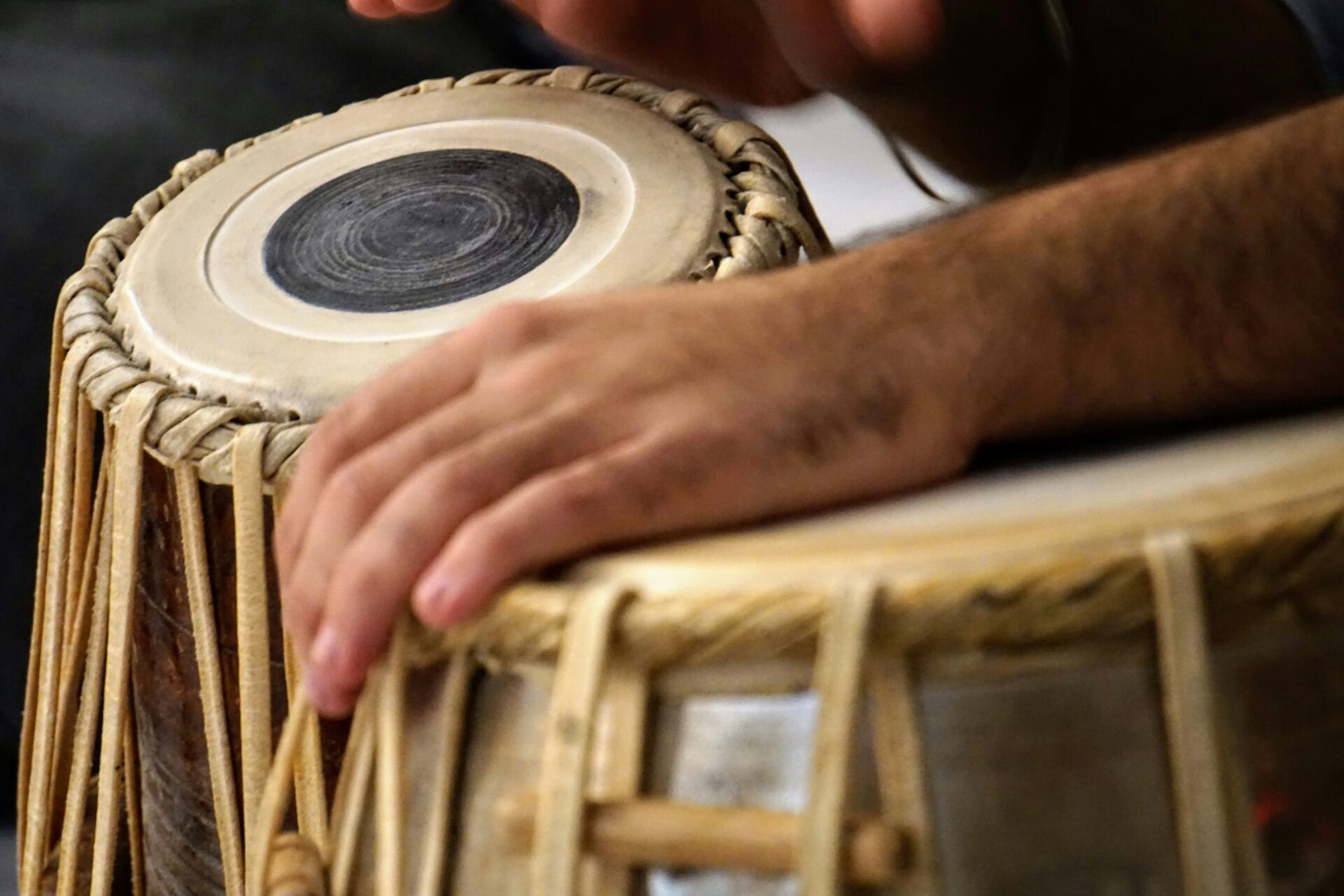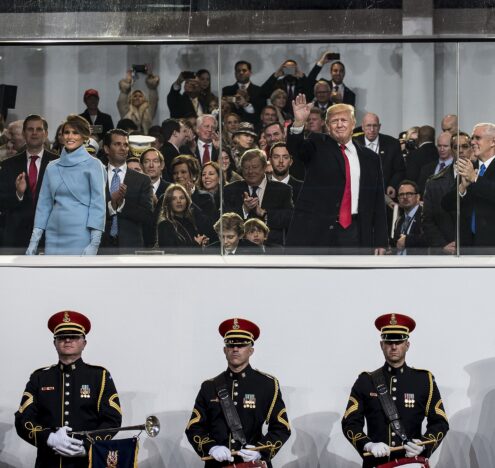Amid the relentless bombardment in the Gaza Strip, a soft guitar melody cuts through the chaos. Hossam Hassouna, a 26-year-old musician, cradles his instrument. Despite the crippling Israeli blockade that has choked Gaza for over 17 years, restricting access to musical instruments, Hassouna’s passion for music remains unquenched. With the world as his teacher via YouTube, he has mastered the guitar and other instruments, crafting a sanctuary of sound under siege.
On Oct. 7, 2023, the situation drastically changed for the residents of Gaza as Hamas fighters launched a significant attack on southern Israeli settlements. This attack, unprecedented since the establishment of Israel, resulted in the deaths of 1,200 people, and over 240 taken hostages in Gaza, according to figures provided by Israel. The Israeli response has resulted in 37,598 deaths and 86,032 others injured, more than half of each are women and children, according to Gaza’s Health figures.
Today, Hassouna’s tent is both a home and a concert hall. Fabric walls vibrate with the strumming of his guitar, a stark contrast to the harsh reality outside where Israeli missiles frequently redraw the skyline carrying the news of more deaths. “We’ve been displaced and on the run for eight months, but our journey of escape continues,” Hassouna said. Inside the tent, life unfolds under harsh conditions — extreme heat, the constant annoyance of insects, and the looming threat of disease are daily adversaries for Hassouna and the hundreds of thousands like him.
“Finding a guitar after 206 days was indescribable,” Hassouna shared in a video on his Instagram, capturing a rare moment of joy amid the conflict. “Since the war began, every day was a quest to find a guitar because I lost mine along with other instruments when my house in Gaza City was bombed,” he recalled. Holding the guitar, he added, “Despite its poor quality, this guitar has been a breath of fresh air among all this death.”
Songs of Survival
Together with friends who also have musical instruments — from the deep twang of the oud to the rhythmic beat of tabla — Hassouna has taken to the makeshift stages of shelters and schools across Gaza. There, they perform melodies laden with hope to an audience weary yet resilient, their music a reprieve for the displaced souls seeking solace. “I’ve always been able to make a child laugh, why should I deprive them of music?” Hassouna contemplates his role as more than a musician but a beacon of normalcy in these harsh times.
War has halted many aspects of life, including Hassouna’s love story. Before Oct. 7th, he was on the cusp of starting a new chapter with his beloved. “I’ve lived through harsh conditions; my uncle was martyred, and my family’s home was destroyed. I had bought a house two months before the war, and it was also fully bombed,” Hassouna recounted. Yet, his resolve to build a life amid destruction remains undeterred. “When it became clear the war would drag on, I decided on May 26 to complete my marriage in a tent — a shelter for musicians,” he shared joyfully. The couple’s first six days as newlyweds were spent in this communal refuge, a brief interlude of peace in the relentless Israeli invasion of Rafah.
Despite many warnings against invading Rafah including Biden’s warning that Rafah was a redline, the city’s invasion has led to mass displacement again. The population in Rafah has dropped from from 1.4 million displaced people to just about 65,000 remaining amid the chaos as reported by OCHA. “People continue to be displaced amidst active fighting and bombardment,” OCHA said. Meanwhile, overcrowded conditions in displacement sites across Deir al Balah, Khan Younis, and Al Mawasi barely sustain the lives of over 130,000 people clinging to hope under fragile conditions.
“In all of Gaza, you won’t find one or two guitars in different areas now,” Hassouna pointed out, indicating the extensive damage to Gaza’s musical landscape, where airstrikes have not spared even the residential areas harboring music shops. Despite the overwhelming challenges and profound losses faced by artists in Gaza, Hassouna’s resolve is unwavering, “We will keep playing and singing for our homeland.”
A Melodious Lifeline
In another tale of loss and passion, Raji al-Jaru, a 31-year-old guitarist and singer, finds solace and resistance in the strings of his guitar. In a disheveled tent within the Al-Nuseirat refugee camp, he recounts his dramatic journey with music and the birth of “Osprey V,” Gaza’s first rock band — an ensemble that rose like a phoenix from the ashes of blockade and warfare.
“I worked to establish an international band that speaks in the language of the West to convey the stories of suffering that happen in the Gaza Strip,” Raji described his dream passionately, as he recounted the origin of their first official song “Home,” which narrates their deep love for Gaza and the agony of existence within its confines.
Raji’s love for music transcended ordinary passion; it led him to establish the first and largest music store in Gaza in 2003. The two-story building, with its stark black and yellow facade, was filled with a diverse array of both Eastern and Western musical instruments. Each corner of the store was a testament to Raji’s dream — to make every musical aspiration achievable in the confined Gaza. “The store was a revolutionary state in the world of sound and music for the Gaza community,” Raji explained, his voice filled with pride and a tinge of sorrow as he remembered the cultural oasis he once cultivated — a beacon for Gaza’s rich musical heritage and a narrative counter to occupation.
The war has left indelible marks on Raji and his peers, multiplying their tales of hardship exponentially. “The war caused an unnatural shock, and countless stories will be told through music and its nuances amid the war,” he says, acknowledging the transformative and traumatic impact of the conflict on their lives.
Clutching his phone, its battery precariously low, and headphones snugly in place, Raji momentarily escapes the relentless roar of Israeli missiles through his music. These brief interludes of melody offer him a lifeline, a chance to reconnect with the world beyond the war. “I listen to music, and I cling to hope,” Raji reflected on his thwarted dreams and recalled when he was invited to France to perform. The war made the planned travel impossible.
Raji’s collaboration with Aziz Maraka, a renowned Jordanian composer and singer, represents a defiant act of cultural preservation and reclamation of identity. Their rendition of “Mawteni” became a symbol of homeland love and pride. “When my friend Aziz asked me to participate, I told him, if I can’t sing now, I’ll never be able to do it,” Raji recalled. His decision was underscored by a fierce urgency to tell their stories through music, especially in times of war.
For Raji, this war was not just a repetition of the horrors his ancestors narrated about the 1948 Nakba or the massacres at Sabra and Shatila and Deir Yassin, but something far more devastating. “All forms of occupation and apartheid, the loss of loved ones and displacement, and more, we have seen them in an uglier form,” he said, his voice heavy. His commitment to using music as a form of resistance is more than an artistic choice; it is a life mission infused with the weight of history and the urgency of the present.
Raji bitterly recalls the last stage his band performed on two weeks before the war, at the Orthodox Church in Gaza City. “Unfortunately, this place was erased from existence in a systematic attack on Palestinian culture,” he lamented, referencing other well-known cultural and artistic venues targeted by Israel, such as the Rashad Shawa Hall and the Al-Mishal Theater in previous conflicts. “They want to erase the Palestinian identity as if it were just land and sand uninhabited by anyone and without any pulse of life or culture. And this is what we try to confront, this land has roots and people with a culture and art known throughout history,” Raji said, his words weighted with a sense of responsibility.
The Silence of Exile
Speaking from a safe place, but with his soul still tortured, Ayman Maghamis, a 39-year-old rapper and cultural guardian, narrates his harrowing odyssey from the echoes of rocket fire to the relative silence of exile. His role as a program director at Delia Arts was not just a job but a lifeline, extending the pulse of Palestinian culture through music and dialogue.
“As a Palestinian, I always wondered what my role was in all that happens to us? How can I deliver the message?” Ayman’s question resonates through his efforts, casting a long shadow over his every act and performance. This existential inquiry drove him from the small stages of Gaza to the broader platforms across Europe and the Arab world for the past two decades, sharing not only his music but also the poignant narrative of his people’s suffering.
“The war caused an unnatural shock, and countless stories will be told through music”
Raji al-Jaru
“The war has ended all the music in this world,” he said, a profound sadness dulling the usual fervor in his voice. His daily life became a relentless cycle of survival, each task overshadowing his passion for music. “I couldn’t listen to music for 5 minutes, there was no time. You wake up in the morning to light the fire, then you stand in line for water, then for flour, and light the fire again,” he detailed the grueling routine that filled his days, leaving no room for the solace of song.
In a bid to salvage some semblance of the world he knew, Ayman poured his energy into a unique project before his forced migration — a musicians’ shelter in Rafah, a sanctuary amidst the storm of conflict. There, he orchestrated an enclave where traumatized children and their families could find brief respite through music. “We focused on music activities for children and their families so that the general atmosphere was different from the war, the bombing, the destruction, and the blood they see outside this shelter.”
In this makeshift refuge, the laughter of children and the strum of guitars crafted pockets of peace where Ayman found the strength to create. “Children were enjoying it, especially because there were musicians who believed in this idea and presented it from their hearts,” he recalled, the memory bringing a fleeting smile to his wearied face.
Within the fragile walls of this shelter, amidst the strain of survival, Ayman’s creativity flickered back to life. “Inside this shelter and warm embrace, I wrote many songs and thoughts that went through my mind,” he shared.
His displacement to Egypt, though a physical escape, did not unshackle his soul from the binds of Gaza. Each day abroad is marred by the shadows of loss. “Eight months of war, we forgot simple things like a piece of chocolate, I forgot what drinkable water was, and I forgot that taking a routine shower or sleeping in a bed was normal,” he said.
His final words resonate with a chilling clarity, “Even traveling to Egypt, all forms of language eloquence, musical talent, and capability disappear in the presence of the death we saw.”




















